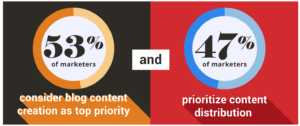Is Blogging Dead in 2020?: Adding a Blog to Your Website Can Make a Positive Impact on Your Business
Year after year, the naysayers claim that blogging is dead. Really??!! According to Arrigo Lupori at Koalarank, “Opinions are great. They help us see the world from our own perspective and they are great conversation starters. But they are also polarizing by nature. Saying that blogging is dead in 2020 is just not true, and we have data to back up this statement. The number of blogs published in the U.S. is still growing by the day, reaching 31.7 million blogs by the end of 2019.” It’s clear we’re not planning a funeral for blogging just yet, and we won’t be planning one in 2021.
According to Neil Patel here’s the bottom line.
“For your blog to gain traction, several elements must come together seamlessly.
- Your audience targeting has to be on point.
- Your content has to be of superb quality.
- Your PR strategy has to be brilliant.
And that’s just the beginning. Each of these elements has details to be worked out.
Is it hard work? Yes, but the rewards can be remarkable. I can say with certainty that blogging has been one of my best business decisions. It helped me attract a large and loyal audience organically.”

Blog content is considered a top priority by 53% of marketers, and 47% of marketers prioritize content distribution. In other words, when done correctly and consistently, blogging works. This doesn’t mean that your brand doesn’t require a social media presence, along with videos and other mediums. It does, but there are some compelling reasons to add a blog to your marketing strategy toolkit.
Why You Need a Blog in 2020 and Beyond
Credibility
With a well-written, credible blog on your self-storage site, you can present yourself as an expert. Craft personalized stories that resonate with your audience. Your blog can post about moving and packing, how to find the right self storage facility for your needs, and the best way to store your holiday decorations. You can post industry trends and conference updates that impact customers. Gain audience trust and referrals by anticipating customer questions and solving problems.
Organic Rankings
Google caters to sites that it “thinks” users want to see when they use a search query. The troublesome thing for small businesses is that Google uses paid ads when a person searches for keywords related to your brand. For example, if you own a pizza shop, you’ll be outranked on Google by a big brand like Pizza Hut. If you have a small self-storage business, you’ll be outranked by one of the large Real Estate Investment Trusts (REITs). This is why you have to keep up with consistent, relevant blog posts that incorporate the keywords your prospective customers are searching with.
Boost SEO
Adding a blog to your website can positively impact your SEO. A blog enables you to rank for certain keywords. Your self-storage business may already rank for RV storage, boat storage, or climate-controlled storage. Adding blog posts for “using climate-controlled storage for your valuables” or “tips to store your RVs” will allow you to optimize your site for keywords that attract audiences that are looking for different things. A person who wants to store valuable antiques or paintings may have been wondering where and how to store them. They might contact your facility to discuss options for storing these items.
Create High-Quality Content for Your Marketing Strategy
Your online marketing strategy is designed to attract customers, and a blog will bring new traffic to your site. A well-crafted blog can captivate your audience and keep them engaged in your content a little longer. The trick is to tell a story that is entertaining and aligns with your purpose.
Turn Social Media Reach into Sales
Write blog posts with your social media audience in mind, and it will be easy to post relevant information for your followers. Use visuals to engage your audience and make your content more interesting even if it’s identical to what they’ve read before. Turn social media into sales by inviting your audience to read more on your website.
A successful blog should precisely target your audience, contain high-quality content, and be connected to a brilliant content marketing strategy. While it should align with your business goals, your priority should be to educate and engage your audience while making them feel that you understand and genuinely care about their problems. No, blogging is not dead. It’s alive and kicking it’s way into 2021 and beyond!


